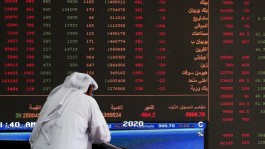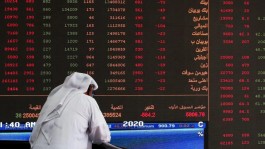Treasuries resumed selling with most stocks in Asia falling after Federal Reserve Chairman Jerome Powell said policymakers would likely wait until after March to cut interest rates, doubling the impact of US jobs data that appeared last Friday, and came stronger than... Expected.
US 10-year Treasury bond yields rose by about 7 basis points after the broadcast of Powell's interview with the CBS 60 Minutes program, adding to the advance they achieved last Friday when they rose 14 basis points. Powell's dialogue, which was broadcast yesterday, Sunday, in the United States, was recorded before jobs data released on Friday, which showed that American companies raised salaries in January by the largest amount in a year.
The decline in US Treasury bonds was also reflected in Asian bond markets, as it cast a shadow on government debt in Australia and New Zealand, and yields in both rose by about 10 basis points. As for government bonds in China, they were able to survive this decline, and 10-year bond yields there fell by two basis points.
Stock performance in Asia today
Stocks in China fell, continuing to bled losses incurred on Friday. The CSI 300 index also declined
By more than 1%, while the CSI 1000 index of small stocks fell by approximately 8%. The declines came despite the Chinese Securities Regulatory Commission's statement issued yesterday, in which it said that it would take measures to prevent abnormal fluctuations in the market, while making more medium- and long-term lending available in the market.
Benchmark indices in Australia, South Korea and Hong Kong also fell. US stock futures fell after the S&P 500 index rose 1.1%, hitting a new record high on Friday. The series of strong performance of the US index comes with its strong start to the month of February, which is usually one of the most turbulent months of the year for US stocks, according to historical data.
But Japanese stocks swam against the tide and were able to rise, as Mitsui Fudosan shares jumped after the Financial Times published a report indicating that Elliott Management had acquired a 2.5% stake in the company, and also called for the buyback of shares. .
Currency and commodity markets
On the currency front, the price of the US dollar rose against most of its major counterparts. While the Japanese yen fell to trade at about 148 yen to the dollar.
Last Friday, investors' bets on a cut in federal interest rates next March fell to about 20% compared to about 40% on Thursday, as economic flexibility reduces the possibility of easing monetary policy in the near future.
However, despite the decline in expectations of a rate cut in March, Ed Yardeni, president of Yardeni Research, wrote in a note: The market still expects five cuts to be implemented in US interest rates this year, while Fed officials are likely to continue ruling out the idea of implementing large cuts in... Benefit.
As for crude markets, oil prices did not witness significant changes, and traders took into account the impact of US and British strikes against Houthi targets already over the weekend, while the Iran-backed Houthi group pledged to respond. The price of West Texas Intermediate crude did not change significantly, after falling 7.4% last week, which is the largest decline it has experienced in one week since October. The price of gold also declined slightly, approaching $2,037 per ounce in trading.
Former US President Donald Trump indicated that he might impose a tariff on Chinese goods of more than 60% if he were elected, which represents the latest round of his hostile statements against China (the largest country that supplies goods to the United States).







































